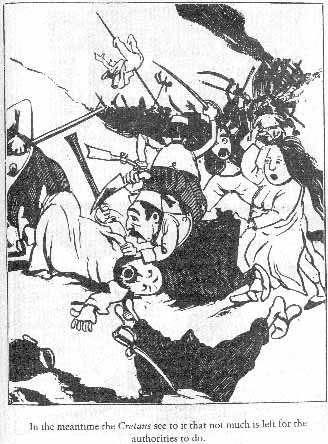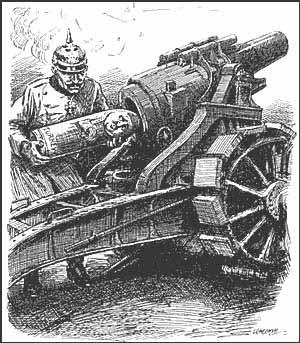When I examined the facts from the Armenian perspective,
the evidence I found most troubling were from the Germans. After all, the Germans were the
allies of the Turks; if the Germans said the Turks were guilty of genocide, that is
something worth listening to. Just like the Armenians' allies, the Russians, documented
the atrocities of the Armenians, as they went about slicing and dicing innocent Turkish
villagers.
However, the difference is, the Russian officers who testified against the
Armenians were on the field, and served as genuine eyewitnesses. Almost all the German
reports I've seen that incriminated the Turks were far from the action.
A brief background is called for. Did the Germans and the
Turks jump into bed together because they were madly in love, or because they needed the
services of a hooker?
 |
|
The caption:
"In the meantime the Cretans see to it that not
much is left for the authorities to do."
|
The fact is, the Germans were no different as far as their
Christian European counterparts regarding the disgusting image of the Terrible Turk.
Germans were brought up with the same prejudices. The Germans fought wars with the Ottoman
Turks through the centuries... few Germans (who never had a chance to meet the mysterious
Turks firsthand) regarded the Turks as good human beings.
The picture is from Andrew Wheatcroft's "The
Ottomans," which I would recommend heartily to our Armenian friends to get an
even-handed view (realizing that any author who writes about the Turks in a way that
doesn't regard them as devils would not be deemed objective and possibly in the employ of
the Turkish government): "Kladderadatsch, 30 August
1896, shows that the German attitude to the Ottoman was not so very different from that of
the other European nations. Once again the Ottomans impale, stab and kill at will this
time in Crete. The cartoon mocks the Ottoman claim that this was a civil war."
So here you have these good, Christian Germans, brainwashed
through centuries of how barbaric the Turks are.... how many would manage to erase their
prejudices while filing reports?
Johannes Lepsius
was a holy man who detested the Turks. He never managed to travel into the heartland of
the Ottoman Empire to see things firsthand during the war years, although he begged
Ambassador Wangenheim to get Talat Pasha to give permission. Photographer Armin Theophil Wegner, whose works only depict suffering
people (and some corpses), in a devastated land littered with suffering people and
corpses, is said to have offered "documented proof" of the genocide. I haven't
come across any from the Wegner collection that demonstrated a state-sponsored plan for
extermination. (And what kind of a German name is "Theophil," anyway?)
Armenian sources sometimes allude to a damning list of
comments from Baron von Wangenheim. Wangenheim was just like Ambassador Morgenthau,
probably never venturing beyond the city limits of Istanbul. he relied on the reports of
consuls and perhaps Armenians. What is being offered are opinions... not facts.
One such consul was Max Erwin von Scheubner Richter; he
wrote, "The Armenians of Turkey for all practical purposes have been
exterminated." Given that one million Armenians survived from a neutrally
figured pre-war population of 1 million to 1.6 million, we can determine exactly how much
credibility Herr Richter deserves.
Incidentally, Richter would become a Nazi, managing the
SA... and would be shot dead in 1923, during Hitler's premature misstep in challenging the
State. Some Armenian scholars would have us believe Richter whispered genocidal thoughts
in the future Fuehrer's ear, implanting the notion of the Holocaust. Armenians will grasp
at any straw to make the Armenian "Genocide"-Holocaust connection.
On the other side of the coin, General Liman von Sanders,
high commander of the German forces, as witness for the defense in
Soghoman Tehlirian's trial (i.e., an unfriendly witness), testified: "In the five years I was in Turkey, I never saw an order signed by Talaat
against the Armenians..." Since the Germans were, for all intents and
purposes, behind the workings of the Ottoman war machine, how is it possible that such a
key German general not come across any government-sponsored genocidal order? (Von Sanders
further testified he received many telegrams.) If a government decides to commit genocide,
they would have to let their local officials to know about such a policy, so that the
genocide could be carried out.
 |
|
The caption of this PUNCH cartoon
Kaiser: "Leave
everything to me. All you've got to do is explode."
Turkey: "Yes, I quite see that. But where shall I be when
its all over?" DATE: Nov. 11, 1914. ARTIST: Raven Hill.
|
The Tehlirian trial
seemed pre-determined; there are statements in the transcripts that provided major clues.
The broken Germans did not wish to carry the burden of being accused of supervising the
policy against the Armenians. There were four or five brilliant Armenian-paid defense
lawyers to only one prosecutor, and all the witnesses were unfriendly in a cursory two-day
trial where the defendant was allowed to walk free... in this historic case of
murder-justification. It seems the Armenian hero, who shot Talat Pasha in the back of the
head, was not even tried for bravely shooting and wounding Talat's wife.
Regardless, there is other German testimony offering
evidence to the contrary.
Lieutenant General Bronsart von Schellendorf was the commander-in-chief of
Turkish Land Forces, and he was not allowed to be a witness in the Tehlirian trial. In
frustration, he wrote an article which was published in Deutsche Allgemeine Zeitung on
24.7.1921, in part stating:
In the Tehlirian case, only the
people with poor knowledge about the event were listened as witnesses. The ones who saw
the truth were not invited to the trial. Why were the German officers, who were on duty in
the region, not accepted as witnesses? I want to convey my knowledge about the event via
this article since I was not listened as witness . We should take a look at the history in
order to understand the accusation of chief vizier Talat who had been killed.
Testimony of other Germans may not be as reliable since the
Germans were, after all, allied with the Turks. However, the voice of Schellendorf, a
politically unconnected army officer, resonates with sincerity. And he was in the heart of
the action. He obviously felt strong enough about the injustice he perceived to take the
trouble to tell the world the real side of the story.
In conclusion, because a German offers his opinion that the
Armenians were annihilated, in words very likely translated by the fact-twisting
Vahakn Dadrian, does not amount to proof... especially when we know the Armenians
were far from annihilated. The Germans who said such things were not eyewitnesses, and
were affected by the same emotional and mostly concocted reports supplied to Morgenthau's
consuls: the missionaries and the Armenians.